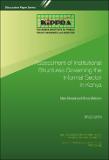| dc.description.abstract | Institutions play a role in determining the economic growth and development
of a country. Like many developing countries, Kenya focuses on policy, legal
frameworks and development strategies for MSEs due to their ability to improve
the competitiveness of a country in the global economy. There have been concerted
efforts by the Kenyan government to formalize the informal sector which
continues to grow tremendously, constituting 83.4 per cent of total employment.
To address these challenges, the government and private sector has come up
with institutions, policies, regulations and laws to coordinate, harmonize,
manage and promote the development of the informal sector. The institutional
framework used in this paper is a modification of the Institutional Analysis and
Development (IAD) framework by Ostrom. The study involved a desk review
of legal frameworks, policies, and regulations and institutions relevant to the
informal sector and analysis of County Business Environment for MSEs (CBEM)
Survey 2019. The findings include: Poor coordination, harmonization and
management of the MSEs sector; Weak collaboration between National and
County Governments in delivery of MSEA functions and development agenda for
MSEs; overlapping and duplication of policy mandates such as those of KENIA,
KIRDI and KIE; Lack of policies in some critical areas such as incubation, common
manufacturing; Low level of training and capacity building; Low uptake of
government funding initiatives such as the Youth Enterprise Development fund
and Uwezo Fund; Inability to access financial assistance majorly due to lack
of financial records and lack of collateral. | en |

